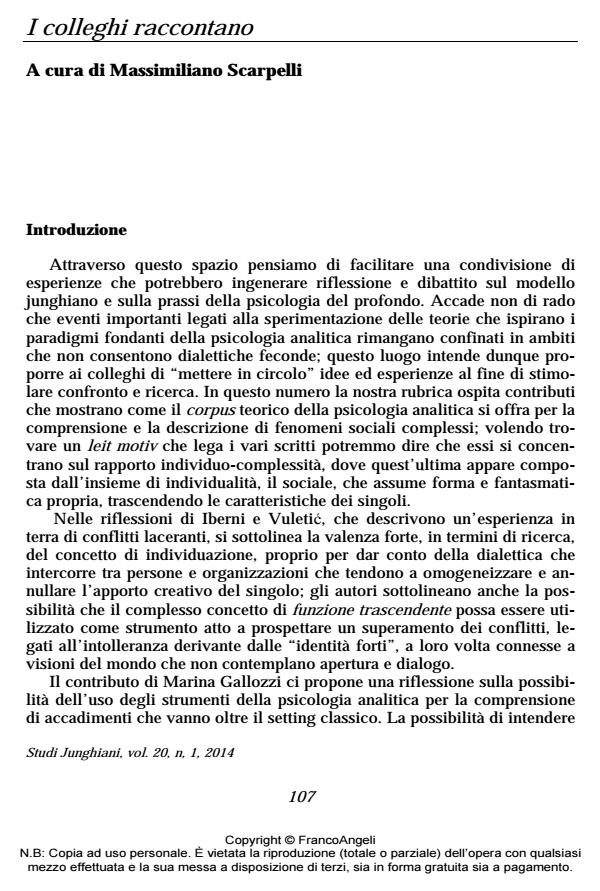I colleghi raccontano. Diventare psicologo analista: il percorso formativo di router / L’ascolto analitico in contesti istituzionali: gruppo di approfondimento teorico-clinico / Il Grande Gruppo
Journal title STUDI JUNGHIANI
Author/s Massimiliano Scarpelli, Elisabetta Iberni, Georgije Vuletic, Marina Gallozzi, Paola Russo
Publishing Year 2014 Issue 2014/39
Language Italian Pages 16 P. 107-122 File size 108 KB
DOI 10.3280/JUN2014-039009
DOI is like a bar code for intellectual property: to have more infomation
click here
Below, you can see the article first page
If you want to buy this article in PDF format, you can do it, following the instructions to buy download credits

FrancoAngeli is member of Publishers International Linking Association, Inc (PILA), a not-for-profit association which run the CrossRef service enabling links to and from online scholarly content.
- Berg A., Salman T., Troudart T. (2011). Panel: What could be Jungian about Human Rights work? Journal of Analytical Psychology, 56: 362-374. DOI: 10.1111/j.1468-5922.2011.01914
- Jung C.G. (1928). DieBeziehungen zwichen dem Ich und Unbewussten (trad. it. L’Io e l’inconscio. In: Opere, vol. 7. Torino: Boringhieri, 1983).
- Jung C.G. (1934). Vom Werden der Persönlichkeit (trad. it. Il divenire della personalità. In: Opere, vol. 17. Torino: Bollati Boringhieri, 1991).
- Jung C.G. (1935). Grundsätzliches zur praktischen Psychotherapie (trad. it. Principi di psicoterapia pratica. In: Opere, vol. 16. Torino: Boringhieri, 1981).
- Jung C.G. (1953-66). Über die psychologie des Unbewussten (trad. it. Psicologia dell’inconscio. In: Opere, vol. 7. Torino: Boringhieri, 1983).
- Mathers D., eds. (2009). Vision and Supervision. Jungian and Post-Jungian perspectives. London, New York: Routledge.
- Papadopoulos R.K. (2009). Extending Jungian Psychology. Working with survivors of political upheavals. In: Heuer G., ed., Sacral Revolutions. London, New York: Routledge.
- Samuels A. (2004). Politics on the Couch? Psychotherapy and Society. Some Possibilities and Some Limitations. Psychoanalytic Dialogues, 14, 6: 817–883. DOI: 10.1080/1048188140934880
- Samuels A. (2010). Panel: The trascendent function in society”. Journal of Analytical Psychology, 55: 228–253. DOI: 10.1111/j.1468-5922.2010.01838_3
- Tibaldi M. (2013). Practicing Jungian Analysis in East Asia. A Western Perspective. Congresso Internazionale IAAP Jung, Asia and Interculture. Jung Across Cultural Borders, 10/17-10/20, 2013, Taiwan Institute of Psychotherapy (TIP), Taiwan Jung Developing Group, Taiwan National Central Library, Trend Educational. Aite P. (1987). Sofferenza psichica e ascolto analitico. Rivista di Psicologia Analitica, 36.
- Jung C.G. (1929). Die Probleme der modernen Psychotherapie (trad. it. I problemi di psicoterapia moderna. In: Opere, vol. 16. Torino: Bollati Boringhieri, 1981). Ancona L. (1993). I gruppi allargati. In: Lo Verso G., Federico T., a cura di, Attraverso il cerchio. Roma: Borla.
- Ancona L. (2003). Pragmatica clinica del gruppo mediano e grande. In: Di Maria F., Lo Verso G., a cura di, Gruppi. Milano: Cortina.
- Apollonio Rodio (1986). Le Argonautiche. Milano: Rizzoli.
- Henderson J. (1984). Cultural Attitudes in Psychological Perspective. Toronto: Inner City Books.
- Jung C.G. (1946). La psicoterapia oggi. In: Opere, vol. 16. Torino: Boringhieri, 1981).
- Kaës R. (2007). Un singulier pluriel. Paris: Dunod (trad. it. Un singolare plurale. Roma: Borla, 2007).
- Kernberg O. (1998). Ideology, Conflict and Leadership in groups and organizations. Yale: Yale University Press (trad. it. Le relazioni nei gruppi. Milano: Cortina, 1999).
- Kimbles S.L. (2000). The cultural complex and the mith of invisibility. In: Singer T., ed., The Vision Thing. London: Routledge.
- Pieri F. (1988). Dizionario junghiano. Torino: Bollati Boringhieri.
- Singer T., ed. (2000). The Vision Thing. London: Routledge.
- Singer T. (2003). The cultural complex and archetypal defenses of the collective spirit, baby Zeus, Elian Gonzales, Constantine’s sword, and other holy wars. The San Francisco Jung Institute Library Journal 20, 4: 4-28.
- Singer T., Kimbles S.L. (2004). La teoria emergente dei complessi culturali. In: Cambrey J., Carter L., a cura di, Psicologia Analitica. Prospettive contemporanee di analisi junghiana. Roma: Fioriti, 2010).
- Trevi M. (1987). Per uno junghismo critico. Milano: Bompiani.
- Turquet P. (1975). Threats to identity in the large group. In: Kreeger, L., ed., The Large group (trad. it. Il gruppo allargato. Dinamica e terapia. Roma: Armando, 1978).
Massimiliano Scarpelli, Elisabetta Iberni, Georgije Vuletic, Marina Gallozzi, Paola Russo, I colleghi raccontano. Diventare psicologo analista: il percorso formativo di router / L’ascolto analitico in contesti istituzionali: gruppo di approfondimento teorico-clinico / Il Grande Gruppo in "STUDI JUNGHIANI" 39/2014, pp 107-122, DOI: 10.3280/JUN2014-039009